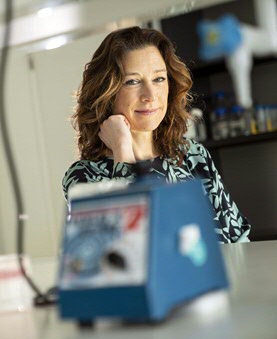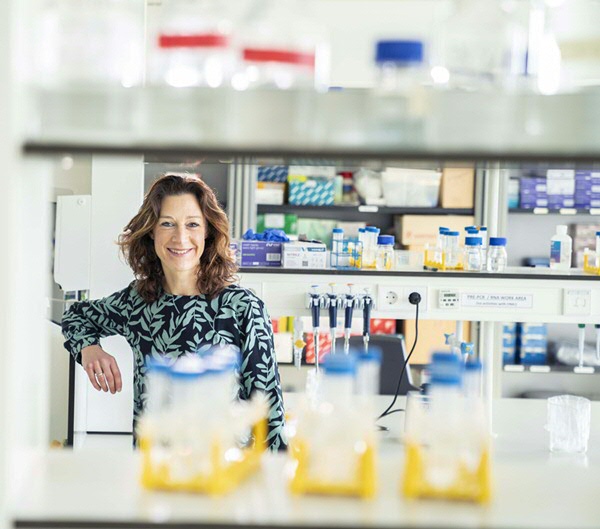Fascinated by serotonin
Jocelien Olivier is fascinated by one of the most influential neurotransmitters in our brain, serotonin. It affects our mood, sleep, appetite, social and sexual behaviour, memory and emotions. In her research at the Groningen Institute for Evolutionary Life Sciences (GELIFES), she is trying to find out what role serotonin plays in human development. She is doing this, among other things, by looking at the use of antidepressants during pregnancy.
Text: Merel Weijer, Communication UG

Knockout rats
Considering that her father is a professor of psychopharmacology, Olivier’s enthusiasm and fascination for neurobiological research is not surprising. As a girl, she once went to an open day with her father and thought: ‘I want to work with rats.’ And that is exactly what she went on to do. Her PhD dealt with knockout rats, which have one gene turned off, and she still needs laboratory animals for her research. She is sometimes asked whether the use of laboratory animals is really necessary. In response, she explains what her research is about exactly. Olivier: ‘In our research, we look at behaviour but also at how the brain adapts. Obviously, we cannot extract or manipulate babies’ brains to examine them in detail.’ In addition, she examines the effect of antidepressants in the absence of depression. ‘Scientifically, the best thing would be to give antidepressants to healthy pregnant women, but obviously we can’t because everyone agrees this is unethical. So we really depend on laboratory animals. We have to be transparent about what we do.’
Sexual problems
In addition to research into the use of antidepressants during pregnancy, Olivier conducts studies on sexual behaviour. ‘Antidepressants also have a major impact on sexual behaviour. People can suffer from unwanted side effects.’ Olivier turns this problem around in her research. People who do not have depressive symptoms but suffer from sexual problems may benefit from antidepressants. Take the problem of premature ejaculation. If a man takes antidepressants, it will take much longer for him to ejaculate. Olivier looks at how this can benefit the patient. Antidepressants need to be taken for a long time, and they don’t work immediately. This is not helpful if you want to have sex immediately. Then you’d want a pill that works right away, without side effects. Olivier is now trying to find out exactly which brain mechanisms and receptors in the brain are affected and whether she can target them specifically and accurately.

Antidepressants change the microbiome
Research is a quest for answers, but it also yields lots of new questions. Olivier: ‘The more you learn, the better you realize what you don’t know,’ she says. Researchers just discovered that when mothers take antidepressants, their microbiome changes. Other studies have shown that a mother’s microbiome also affects brain development in their offspring. Olivier now wants to find out exactly how that works and what exactly happens. ‘You want to look at all paths of changed development in their offspring. What changes in their behaviour? Are they perhaps more vulnerable to something, or perhaps better protected against something?’
Should women take antidepressants when pregnant?
Olivier chooses her words carefully on the question of whether women should take antidepressants during pregnancy. She is not a doctor and is glad that she does not have to advise patients on such matters. What she can say is that on the basis of the literature and her research, the side effects of this medication do not seem to be so bad. A mother may suffer more from bad depression, for example, and there are studies that say the chances of having a child with autism are higher under this medication, but it has recently been shown that it is not the antidepressants but the mother’s depression that contributes to this. ‘The antidepressants can take away the symptoms but not the underlying mechanisms. So if we can do something to relieve that depression, then we should.’
Differences between boys and girls
Olivier lets down her guard when she continues to talk about a recent and interesting research finding. There are large differences in results between men and women. In rats, the sons of mothers who have been given antidepressants show much greater effects in social behaviour than the daughters. The boys have problems until adulthood, while the girls only have problems when they are very young. ‘Same mother, same upbringing and yet you see a big difference. If, on the other hand, you do not look at social behaviour but rather at symptoms like anxiety and depression, you will see that the girls score much higher on that.’

Unsolicited advice
Her enthusiasm for research also takes her outside her laboratory. She is a board member of the Young Academy Groningen (YAG) and recently also chaired the board of GELIFES. She is very proud of both accomplishments. She is also proud of GELIFES, which chose her although she is still an early-career researcher, not yet a full professor, and a woman. She also really enjoys being part of YAG. ‘It is interesting to see how things are done at various faculties, what problems young researchers encounter, and to give them solicited or unsolicited advice.’ She already regrets the fact that she will have to leave YAG in two years. It has widened her horizon. ‘Previously, I was only concerned with my own research and my own faculty, and I had no idea that things could be very different at other faculties.’
Research is never finished
Olivier is pleased that the UG now wants to focus on interdisciplinary projects in the graduate schools. That is something that YAG started, and it has proved very successful. It means that two or more disciplines can apply together for a PhD student, which results in an interdisciplinary project. Her own research group includes a PhD student whom Olivier supervises, together with Sonja Pyott from the ENT department of the UMCG. Together, they look at what happens after a loss of hearing during various stages of life, starting in adolescence, and the effects on social behaviour and cognition. And, above all, how the brain adapts. Time and again, breaking new ground and seeking connections is what makes her so enthusiastic about her work. ‘It‘s never finished.’
| Last modified: | 16 March 2021 07.59 a.m. |
More news
-
16 April 2024
UG signs Barcelona Declaration on Open Research Information
In a significant stride toward advancing responsible research assessment and open science, the University of Groningen has officially signed the Barcelona Declaration on Open Research Information.
-
02 April 2024
Flying on wood dust
Every two weeks, UG Makers puts the spotlight on a researcher who has created something tangible, ranging from homemade measuring equipment for academic research to small or larger products that can change our daily lives. That is how UG...
-
18 March 2024
VentureLab North helps researchers to develop succesful startups
It has happened to many researchers. While working, you suddenly ask yourself: would this not be incredibly useful for people outside of my own research discipline? There are many ways to share the results of your research. For example, think of a...
